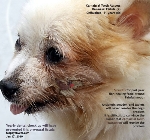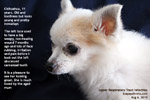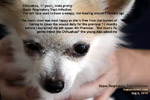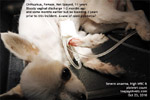CASE 1. PREVENTING TARTAR BUILD UP IN THE DOG'S
TEETH
Dr
Sing Kong Yuen, BVMS (Glasgow), MRCVS
26 October, 2010 |
 toapayohvets.com toapayohvets.com
Be Kind To Pets
Veterinary Education
Project 2010-0129 |
A mother with four children - 12
years, 15 years, 19 years and 23
years brought 2 Malteses that are
2 years old for their annual
vaccination. She made an
appointment for dental scaling.
Dental scaling was done under
anaesthesia. Lots of brown tartar
in the canine and back teeth, but
the teeth are still solid and
strong.
Questions asked by the
mum:
1. Yearly dental scaling?
Not necessary if there is no
tartar. Just ask the vet to
check the teeth.
2. Must brush teeth
daily? Yes, if
practical. If not, every 3
days.
3. Dog does not like
brushing. What to do?
Use thumb brush or rag to
rub back teeth. Use treats
to motivate.
4. How to prevent tartar
build up on the teeth?
Presently the dogs eat
chicken meat mainly. "Add
dry dog food for the dog to
chew," I said. "There are
also chew ropes, but one way
is to feed dry dog food and
brushing of the teeth."
"My dogs will never eat dry
food," the mother said.
"Even you will never eat
biscuits if forced to," I
said to the caring mother.
"The trick is to add 5% to
chicken meat, gradually
increasing to 50% after one
month. Delay dinner as the
dog eats once a day."
As I had time, we talked
about our experiences in
bringing up children and she
had four of them. "My
15-year-old is the
naughtiest and always wants
to go out."
"That's due to her
hormones", I said. "She
wants to meet boys. You need
to spend some time with her,
for example. exercising the
two dogs together with her.
Bonding with her, getting to
know her better." I had
thought that the 12-year-old
daughter would be harder to
manage as she should be
having hormonal changes to
become a woman. Yet it was
the 15-year-old. I don't
know much about daughters as
I don't have any.
The mum said she used to
take half-hourly walks when
first diagnosed with
Diabetes Type II. Now, she
gave up exercising. "You
need company," I said. "It
is just too boring to walk
by yourself and spouses are
usually not available or
interested.
"You have two dogs. Just
take one dog down at a time
since two dogs are noisy. If
you don't take care, you may
get diabetes Type I and then
you will need to inject
yourself everyday ", I
advised the mum. She has to
take care of herself as she
has 4 children and 2 dogs
and that is a heavy
responsibility. |
|
CASE 2. FOLLOW-UP 7 MONTHS AFTER
I EXTRACTED THE ABSCESSED CARNAISSAL TOOTH
Dr
Sing Kong Yuen, BVMS (Glasgow), MRCVS
26 October, 2010 |
 toapayohvets.com toapayohvets.com
Be Kind To Pets
Veterinary Education
Project 2010-0129 |
What to do if you, as a vet do not
feel comfortable in performing
anaesthesia in old dogs which may
only be cured if surgery is done?
I know of one vet who just simply
refers all cases to another
practice. "At least I don't lose
clientele when I refer to this
practice," this senior vet told me. The
practice she referred her
difficult cases to has several vets
and branches. If
my old colleague believes that referring
her difficult cases to this
group practice will not cause her loss
of clientele, I find it hard to
believe. I reserved my comments.
A group practice with more vets has
higher overheads and therefore
needs the caseload to sustain the
profitability of the big
operation and expand. Recently I asked
my mentor about this vet's
comments. My mentor who is in his
late 60s said: "Once you refer a
case, you'll lose your client."
Referring to other practices means
losing clientele. There is no way
to stem such losses if the vet
does not want to perform risky
surgeries that will harm his or
her professional reputation.
Deaths on the operating table are
very emotional and unpleasant
issues. In one example of
the old Chihuahua
with an abscessed carnaissal
tooth, the vet just advised
conservative treatment for 12
months. This case is written at:
Carnaissal tooth abscess in an old
Chihuahua.
Moral Ethics v. Economic
Realities.
This vet would not perform
surgery knowing that the dog might
die. "The vet told me that the
average Chihuahua lives up to 9
years," the young man told me. The
old Chihuahua had already made it
to 10 years and the vet was wary
of killing the old girl by
performing anaesthesia.
The extraction of the infected
tooth would cure the dog and
give her a higher quality of life.
But the dog could be dead on the
operating table when given general
anaesthesia. And his reputation
would be tarnished badly. There
was a competitor round the corner
and grieving owners and their
families with a dead dog on the
operating table seldom has kind
words for the veterinary surgeon.
Some bear grudges for a life-time
and bad-mouth the vet for being
inexperienced. So, I understand
the reluctance of this vet to
perform the surgery.
Anaesthesia in old
dogs is going into areas where
angels fear to tread as it is
high risk. Yet, some surgeries
cure the dog promptly. There is
always a big dilemma for vets
encountering such situations. I
was fortunate in this case as the
old Chihuahua survived. I
will say that some old dogs do die
on the operating table due to
various reasons when I did such
cases.
It was a joy to see this Chihuahua
some 7 months after I extracted
her abscessed carnaissal tooth and
many other teeth. I tried my hand
at making a short video with the
help of an intern at:
Abscessed Carnaissal Tooth
Diagnosis and Treatment Video
Education For Vet Students.
Three follow-up pictures of the
pretty Chihuahua are taken for
viewers:
|
|
7 months ago
Dirty, wet itchy left facial
area below the eye. The mum
had to clean the non-healing
wound for the previous 12
months. It was a daily chore
for the old mother for 12
solid months. |
 |
7
months later
No pain and good looking and a
happy mum. The grown up son had to
seek a vet who would operate on
the dog but he knew it was a high
risk anaesthesia. It is not always
a happy ending. Yearly dental
check up by your vet will prevent
so much dramas and worries for the
family members who are care-givers
to the dog. |
 |
 |
 |
|
CASE 3. FOLLOW-UP 8 MONTHS AFTER
I EXTRACTED THE ABSCESSED CARNAISSAL TOOTH
Dr
Sing Kong Yuen, BVMS (Glasgow), MRCVS
26 October, 2010 |
 toapayohvets.com toapayohvets.com
Be Kind To Pets
Veterinary Education
Project 2010-0129 |
 8
months later.
On Oct 21, 2010, the old Chihuahua passed away
peacefully at my surgery after 2 days of hospitalisation
for not eating, ataxia and severe anaemia. She had an
extremely low red blood cell count and a very high
platelet count. An extremely high white cell count
indicated bacterial infection of the blood.
Her liver enzymes and serum nitrogen were elevated.
Creatinine was normal 8
months later.
On Oct 21, 2010, the old Chihuahua passed away
peacefully at my surgery after 2 days of hospitalisation
for not eating, ataxia and severe anaemia. She had an
extremely low red blood cell count and a very high
platelet count. An extremely high white cell count
indicated bacterial infection of the blood.
Her liver enzymes and serum nitrogen were elevated.
Creatinine was normal
Two blood tests were taken but the second one showed a
very high white cell count. The cause of death was hard
to say without more tests. The high platelet count was
very rarely seen in practice. Could this be a blood
cancer or open pyometra?
"Your dog has lived to a ripe old age," I said to the
young man and his mother who were called to see the dog
to say good-bye on the evening before she passed away.
"I will not be recommending blood transfusion," I said.
"The dog is very old as most Chihuahuas don't live up to
11 years old. "The blood transfusion will just kill
her."
"Put the dog to sleep now," the mum said during the
evening visit. The Chihuahua was unable to stand and her
body temperature was dropping below 36 degrees C.
"No, no, no" the young man said. "She may recover." The
dog was very weak and pale. She was not vomiting nor did
she eat or drink. She passed away around 10 am and I
phoned the young man. He came with his mum.
The young man and his white-haired mum were satisfied that the
Chihuahua had a good 8 months of high quality life.
After the cremation arrangements and before saying
good-bye, the mum hugged me to thank me outside the
surgery entrance. I was surprised as Chinese
baby-boomer generations seldom hug outsiders or even
family members. That is part of my baby-boomer generation's culture.
Chinese seldom hug each other as we are not brought up
to hug each other.
Then she hugged her son who comforted her. We said good
bye. I had a heavy heart that morning as there was
nothing I could do to reverse the impending death. Blood
transfusions would not work but would just add to my
veterinary income. I feel that it is not right to
milk my clients by advising blood transfusion when there
is no hope of a longer life. I am sure the son would
approve of blood transfusions but it would not prolong
the dog's life as the kidney and liver disorders were
due to old age. The whole body system was shutting down
due to old age.
Would a spay when this Chihuahua was in her younger days
help to make her live longer than 11 years of age? I
believe it would.
"Did the dog lose a lot of blood?" I asked the young man
earlier after getting the blood test result of severe
anaemia. "No," he said. "Was she spayed?" I
wanted to confirm as this dog was adopted. I noted a swollen vulval lips of snow white in colour
due to severe anaemia. The normal colour should be pink.
Mum said: "The dog is not
sterilised. She passed a lot of blood suddenly some
months ago and then 1-2 months ago. She had had stopped
bleeding previous two years. I did not think there was
anything wrong with her bleeding."
"In hind-sight, this dog should have been spayed when
she was younger," I told the young man. "It could
have lost blood due to open pyometra recently."
The dog was adopted at the 7th year in a bad condition
and was restored to good health, till the oronasal
fistula affected her 8 months ago for the past 12 months
before. Overall, this Chihuahua had been well cared for
and Mum took her down three times a day to exercise. The
dog was quiet and much loved by all neighbours.
Would she live
longer if her infected carnaissal tooth had been
extracted as soon as she had the facial wound instead of
dragging on for at least 12 months and causing her poor
health, stress and bacterial infection? I believe
it would. Much depends on the dog owner to seek out
treatment early for the sick dog if the illness still
persists.
|
The young man who knew me
through surfing the internet texted: "Thanks so
much for helping April. Most appreciated! :)".
Young people don't converse; they use their fingers to
do the talking. |
TIPS FOR A LONGER
LIFE FOR YOUR DOG OR CAT. An annual health screening
with blood and urine test and dental check up is best
for older dogs if you want your companion to live longer
as many diseases can be prevented. Sterilisation of your
dog is advised.
|
|
More info at:
Dogs or
Cats
To
make an appointment: e-mail
judy@toapayohvets.com
tel: +65 9668-6469, 6254-3326 |
 toapayohvets.com toapayohvets.com
Be Kind To Pets
Veterinary Education
Project 2010-0129 |
|
|
 Toa
Payoh Vets Toa
Payoh Vets
Clinical Research
|
|
|
Copyright ©
Asiahomes Internet
All rights reserved. Revised: October 26, 2010
Toa Payoh Vets
| |
 TOA
PAYOH VETS
TOA
PAYOH VETS TOA
PAYOH VETS
TOA
PAYOH VETS